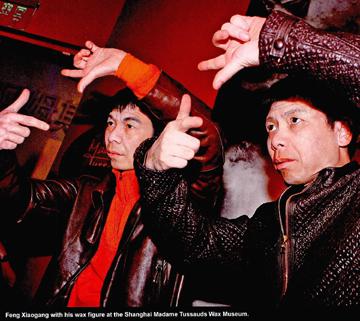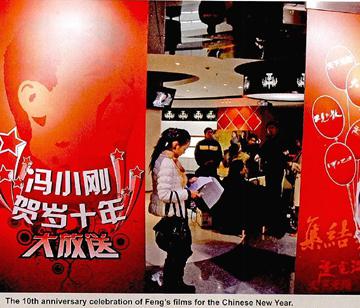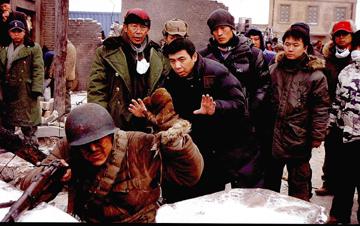Witty But Not Pretty
TANG YUANKAI

THE year 1997 is over. I will miss it.” So ends the 1997 cinematic blockbuster The Dream Factory (Jiafang Yifang) by one of Chinas leading directors, Feng Xiaogang. The line probably expressed Fengs own sentiments at the time. The Dream Factory not only saved Fengs career but also pulled the Chinese film industry out of what had seemed like a terminal nosedive.
Feng first displayed his talents in high-rating TV dramas in the early 1990s, including the hit series A Native of Beijing in New York. But follow-up works fell afoul of censorship bodies and were banned from airing. Backers lost millions of RMB and investors doors were shut in Fengs face. The title of his aborted 1996 production Dog-ass Days provides an apt description of his situation at the time – the film was cancelled 10 days into the shoot. But The Dream Factory proved that every dog has its day. Made for just RMB 4 million, the film earned a staggering RMB 36 million nationwide, with RMB 11 million taken in Beijing alone. It was the only Chinese film of 1997 to entirely cover its production costs through domestic box office receipts.
Since then Feng has completed another nine movies, all of which have done well in Chinas domestic market. His first nine earned an average of RMB 50 million each at the box office, raked in around RMB 30 million in copyright royalties on DVD sales and TV broadcasts, and an additional RMB 150 million in advertising proceeds. These returns have given Feng a commercial clout few Chinese directors can match.
His latest work, The Assembly (Ji-jiehao), exceeded all his previous records. Released at the end of 2007, the blockbuster reaped RMB 235 million within a month of opening. A tale from Chinas civil war of the late 1940s, The Assembly features a cast of relatively new faces. In fact Feng claims his casts combined fees were less than the wage of his cameraman, considered one of the best in China. But Feng Xiaogangs name alone is enough to draw big audiences in China.
The Dream Factory
Heralds a New Era for Chinese Film

When The Dream Factory hit screens in 1997, Chinese cinema had been facing an inexorable financial decline for over a decade. In 1987 the industry posted a RMB 28 million deficit and the Beijing Film Studio, the industrys top player, reported a loss for the first time in its history. With the rise of VCDs – a good number of them pirated – annual cinema visits sharply declined. Whats more, Chinese screens were besieged by a growing influx of foreign productions, mostly from Hollywood. The industry desperately needed a big hit to reverse the protracted downward trend.
Fengs The Dream Factory script was first spotted by Han Sanping, head of the Beijing Film Studio, and Zhang Heping, president of the newly-founded Beijing Forbidden City Film Co. The story centers on four young people who establish a company that helps others live out their dreams for a day. Their clients include a bookseller who desires to be General Patton, a craven chef who aspires to have the guts a revolutionary displays under torture or the threat of death, and a parvenu seeking the “rustic” life of the rural poor. The film contains the bitter humor and sympathy for the underclass that were to become Fengs trademarks.

Han Sanping and Zhang Heping decided to tailor the production to the Chinese New Year season, and agreed to put Feng at the directorial helm, despite strong opposition. He was only allowed to direct on three conditions, however. First, he had to customize the movie for the Spring Festival season. Second, he had to produce a comedy with a happy ending. Third, he had to cast a galaxy of big stars. Feng diligently met these criteria and the rest is history. The Dream Factory beat Who Am I?, starring Hong Kong superstar Jackie Chan, as the seasons number one earner, and redefined the terrain of Chinas film market.
A Decade of New Year Dominance
Ever since The Dream Factory, Feng Xiaogang has been the undisputed king of the New Year season. His dominance is such that he once asked rhetorically: “If I dont make films, what will the nation watch?” His recurrent New Year success has engendered some healthy competition over the past decade. A range of mainland directors threw themselves into productions for the 1999 holiday season, desperate to match the glory of The Dream Factory. Contenders that year included international award winner Zhang Yimou. Fengs Sorry Baby (Mei Wan Mei Liao) effortlessly overcame all opposition, with a box office take exceeding the total earnings of the next five biggest hits that year.
Sorry Babys hero is another of Fengs likeable losers, a timid driver who charters his coach to a tour agent. The driver never gets his fee, despite repeated requests. In retaliation, the irritated man “kidnaps” the girlfriend of the agents boss, though she ends up collaborating with the driver when she hears of his predicament. The two then play a series of pranks on the recalcitrant agent. The comic farce draws on situations and occurrences common in present-day China, making it easy for local audiences to identify with the beleaguered hero.
“My key tenet is to march in step with society,” declares Feng, and thats exactly what the director has been doing since The Dream Factory. In humorous and often biting ways, Fengs films reflect the diversity and complexity of a nation in a state of transformation, examining the way ordinary people try to cope with dramatic societal changes. Ordinary viewers find strength and warmth in his amusing depictions of what life can throw at those without privilege or power. In doing so, his movies fulfill “a fundamental function of popular culture,” claims Dai Jinhua, a movie scholar and professor at Peking University. In essence Fengs work is about the tears and joys of the underdogs of contemporary Chinese society, long ignored by Chinese cinema. Even his third film, Be There or Be Square (Bu Jian Bu San), set in the U.S., focuses on Chinese migrants struggling on the fringes of American society, rather than big shots strutting around Wall Street.
Fengs salutes to the underclass are always accompanied by scoffs at the privileged. The clients in The Dream Factory, for example, include a magnate bored with the wealth and comfort his position affords him. He longs for the bucolic life of the countryside, a desire that soon fades when he is confronted with the reality of a remote, impoverished village. When the dream-fulfilling company comes to retrieve him, the peasants complain the magnate has eaten almost all their chickens in his hunger for meat – a scarce luxury in the local diet.
Feng is a Beijing native, and the supercilious, wordy wit of the capital peppers his films dialogue. The director began his creative career as a playwright, and openly declares he “learned a lot” from Wang Shuo, the famous sharp-tongued Beijing novelist. Fengs humor is often expressed through pithy aphorisms rife with pointed sarcasm, such as “A marriage without love is unhappy, a marriage without a purchased home is even unhappier,” or “What defines successful people? They are the guys who buy the most expensive instead of the best.” Lines such as these invariably became popular quotes soon after appearing in Fengs films.
A Winning Partnership
Actor Ge You is a fellow Beijing native whose accent and style of humor make him perfect for Fengs work. His first appearance in a Feng film was as one of the leads in The Dream Factory. Ge was already a well-known performer, having won the Best Actor Award at the Cannes Film Festival in 1994 for his role in Zhang Yimous To Live.
Bald, lanky, with prominent cheekbones, Ge is in no way good-looking, but exudes an amusing and easy-going nature on screen, while wearing all the human frailties on his sleeve. In Fengs films he is always mischievous, a bit selfish, somewhat greedy and harmlessly erotic. Despite his flaws, Ge always takes the right side at crucial junctures. Under his cheeky exterior lies a soft heart, which sees him helping friends at critical moments and dropping revenge plans for his foes. To viewers delight, he always receives his due reward for his good-heartedness by the end of the film.
The director has named Ge one of Chinas top actors, along with Jet Li and Tony Leung (who recently appeared as the leading man in Ang Lees Lust Caution). Since The Dream Factory, Ge has appeared in all of Fengs productions. “The commoners played by Ge You are witty but not pretty,” says Feng, summing up the essence of their partnership. “Thats what endears him to audiences.”
In fact ‘witty but not pretty is an apt description of Fengs work as a whole. Though his first role in the film industry was working as an art designer, few of Fengs films are overtly “artistic” or particularly innovative. But that is not to say they are without sophistication. Fengs oeuvre is the embodiment of popular cinema. He makes art for the general Chinese populace, and they love him for it.

